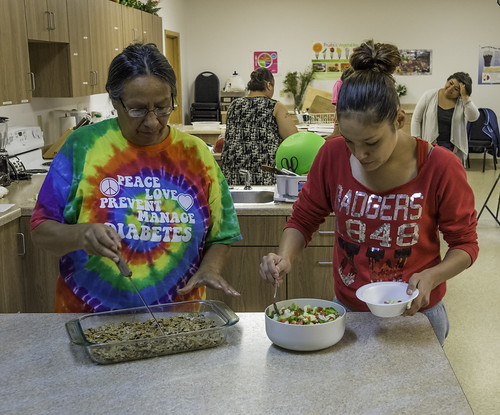
Cooking knowledge, proper planning, and access to healthy foods are essential ingredients to healthy diets. I witnessed this firsthand when I traveled to the food distribution center of the Menominee Indian Tribe of Wisconsin, one of the 20 Indian Tribal Organizations that received funding in 2014 from USDA’s Food Distribution Program Nutrition Education (FDPNE) grants. Their programs offer cooking classes, recipes, nutrition education and resources for Food Distribution Program on Indian Reservations (FDPIR) participants as well as manage a community garden program which provides fresh fruits and vegetables for tribal members.
Creativity and partnerships allow the Menominee’s innovative educational activities to serve as a shining example of best practices. A monthly cooking class combines instruction about basic cooking and food safety with interactive games and hands-on recipe preparation. The class is a joint venture among FDPIR, the Temporary Assistance for Needy Families (TANF) Community Resources Center, and the University of Wisconsin-Extension.
The day my colleagues and I visited, the lesson theme focused on eating away from home. Attendees shared reasons they eat out, such as celebrations, convenience, or camaraderie. A scenario game prompted participants to consider how the interrelated factors of time, money, nutritional value, and social pressure influence their decision-making. After brainstorming strategies to better manage and plan ahead for everyday challenges, the class transitioned to the kitchen area to learn how to prepare zippy zucchini salad and cereal treats with wheat bran flakes.
Gardening is very popular among the Menominee. The food distribution center maintains a community garden as well as raised beds that provide fresh produce – from bok choy to snow peas – to clients. The tribe also seeks to bring gardening home to its members. Using FDPNE grant funds, staff members have the resources available to rototill plots of land, distribute seeds and gardening tools, and build raised planting beds for the elderly and those with disabilities.
Canning classes go beyond traditional jams and jellies. These classes enable participants to enjoy local produce, such as apples and tomatoes, year-round. Everyone goes home not only with new skills and ideas but also with a portion of the session’s products.
In addition to the cooking and canning classes, nutrition educators conduct monthly tastings and present “learn while you wait” visuals to clients coming in to pick up their FDPIR food packages. Resource management, making ends meet, and the tendency to think one day at a time rather than long-term are struggles Jennifer Gauthier of UW-Extension witnesses with her clients. By providing strategies to eat both affordably and healthily, the Menominee’s nutrition education programs are making a difference, one household at a time.

